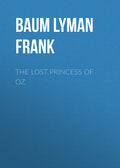
Лаймен Фрэнк Баум
Aunt Jane's Nieces on the Ranch
CHAPTER XIX – INEZ AND MIGUEL
Inez found Miguel Zaloa smoking his cigarette among the orange trees. He was quite alone and looked at the girl in an expectant way as she approached.
“Oh, Miguel!” she cried. “I tell you a secret. Of course it is no secret any more, for now they all know it, up there at the house. Meeldred Travers, the girl from New York, is not Meeldred Travers. She is the child of Leighton the smuggler – she is Meeldred Leighton!”
The old ranchero stood as if turned to stone, but he bit his cigarette in two and it fell unnoticed upon the ground. While Inez regarded him with disappointment, because he had exhibited no emotion at hearing the wonderful news, Miguel turned his back and mechanically walked away through a row of trees. A dozen paces distant he halted and again stood motionless for the space of a full minute. Then he swung around and with slow, hesitating steps returned to Inez.
“You say – she – ees Meeldred Leighton?” he asked, as if he thought he had not heard aright.
“Of course. Don’t you remember, Miguel? She say, when she used to come here, a little girl, with Leighton the great smuggler, you did know her. It was then you served Señor Cristoval, at the big house.”
He nodded, his dark eyes fixed upon her face but displaying no expression.
“Leighton is dead,” continued Inez, delighted to be able to gossip of all she had heard. “They put him in a prison an’ he died. So Meeldred was ashame of her father’s bad name an’ call herself Travers. She is poor, an’ that is why she come here as nurse, so she can find the money that belong to her.”
Miguel suddenly seized her wrist in a powerful grip.
“What money?” he demanded.
“Don’t; you hurt my arm! It is the money Señor Cristoval owed her father. Take your hand away, Miguel Zaloa!”
Slowly he released her.
“Where will she find thees money?” he asked.
“She does not know. Perhaps it is not here at all. But there was a great heap of laces, worth much money, which Señor Cristoval hid in the wall to keep for Leighton.”
Miguel laughed. He seemed suddenly to have regained his equanimity. He began rolling another cigarette.
“They will be old, by now, thees lace,” said he.
“A lace is better when it is old,” asserted the girl.
The man paused, looked at the half-made cigarette and tossed it away. Then he glanced around to see if they were observed and taking Inez’ arm – gently, this time – he led her away from the path and into a thicket of orange trees.
“Thees Meeldred,” he said in soft tones, “you hate.”
“No, no! I do not hate her now. I love Meeldred.”
“So!” he said, drawing in his breath and regarding the girl with surprise. “You tell me once she is witch-woman.”
“I am wrong,” declared Inez earnestly. “She is good. She have been poor an’ friendless, all because of her father, the noble smuggler Leighton. But see, Miguel; I have been all night shut up in the wall with her. We talk, an’ I learn to know her better. I do not hate Meeldred any more – I love her!”
“Sit down,” said the old man, pointing to a hillock beside a tree. Inez obeyed, and he squatted on the ground facing her and coolly rolled another cigarette. “Tell me more about thees girl – Leighton’s girl,” he said.
Inez related Mildred’s story as well as she was able, exaggerating such romantic details as appealed to her fancy, but showing unbounded sympathy for her new friend. The aged ranchero listened intently, nodding his white head now and then to show his interest. When the girl had finished he smoked for a time in silence.
“What Meeldred do now?” he inquired.
“They will hunt in the wall, to-morrow, to find the lace,” she replied. “Meest Weldon say for you to come to the house at nine o’clock, in morning, to help them.”
“Meest Weld say that?”
“Yes. But we have search already – Meeldred an’ me – an’ Meest Bul-Run have search, an’ no lace is there. I am sure of that. I am sure no money is there, too. So Meeldred mus’ stay as nurse all her life an’ help me take care of Mees Jane.”
Miguel pondered this.
“B’m’by Mees Jane grow up,” said he. “What can Leighton’s daughter do then?”
“How can I tell that?” answered Inez, shaking her head. “Always poor people mus’ work, Miguel. Is it not so?”
“Rich people mus’ work, too,” continued the Mexican girl dreamily, as she embraced her drawn-up legs and rested her chin upon her knees. “Was old Señor Cristoval more happy than we, with all the money he loved? No! Meest Weldon works; Meest Hahn works; even Meest Bul-Run works – sometime. If one does not work, one is not happy, Miguel; an’ if one mus’ work, money makes not any difference. So, when Meeldred find she is still poor, an’ has no money an’ no laces, like she hope for, she will work jus’ the same as ever, an’ be happy.”
“I, too, work,” remarked the old man. “I have always work.”
“If you had much money, Miguel, you would still work.”
“Yes.”
“You would not care for money; not you. It would not do you any good. It would not change your life.”
“No.”
Again they sat in silence, as if reflecting on this primitive philosophy. Finally Inez said:
“You remember Leighton, Miguel?”
“Yes. He was good man. He make much money for Señor Cristoval an’ for heemself. Sometime I see them count gold – ten pieces to Señor Cristoval, ten pieces to Leighton – to divide even. Then Leighton will throw me a gold-piece an’ say: ‘That for you, Miguel, because you are faithful an’ true.’”
“An’ Señor Cristoval, did he throw the gold-piece to you, also?”
“No.”
“What did you do with the gold Leighton give you, Miguel?”
The old man shrugged his shoulders. “Tobacco. Some wine. A game of card.”
“An’ were you faithful an’ true, as Leighton say?”
He looked at her long and steadily.
“What you theenk about that, Inez?”
“When people talk about Miguel Zaloa, they always say he is good man. I hear Meest Weldon say: ‘Miguel is honest. I would trust Miguel with all I have.’”
“Meest Weld say that?”
“Yes.”
“Well?”
“I think you are sometime honest, sometime not; like I am myself,” replied the girl.
The old man rose and led the way back to the path.
“To be always honest is to be sometime foolish,” he muttered on the way. “Tell Meest Weld I will be there, like he say, at nine o’clock.”
CHAPTER XX – MR. RUNYON’S DISCOVERY
Sing Fing excelled himself at the dinner that evening, which was a merry meal because all dangers and worries seemed to belong to the past. Also it was, as Uncle John feelingly remarked, “the first square meal they had enjoyed since the one at Castro’s restaurant.” Of course Runyon stayed, because he was to help search the wall the next day, and as the telephone had been repaired Louise called up Rudolph and Helen Hahn and begged them to drive over and help them celebrate at the festive board.
So the Hahns came – although they returned home again in the late evening – and it was really a joyous and happy occasion. Inez brought in the baby, which crowed jubilantly and submitted to so many kisses that Patsy declared she was afraid they would wear the skin off Toodlum’s chubby cheeks unless they desisted.
Mildred had gone to her room immediately after her confession in the court and Louise had respected her desire for privacy and had ordered her dinner sent in to her.
As they all sat in the library, after dining, in a cosy circle around the grate fire, they conversed seriously on Mildred Leighton and canvassed her past history and future prospects.
“I cannot see,” said Beth, always the nurse’s champion, “that we are called upon to condemn poor Mildred because her father was a criminal.”
“Of course not,” agreed Patsy, “the poor child wasn’t to blame.”
“These criminal tendencies,” remarked the major gravely, “are sometimes hereditary.”
“Oh, but that’s nonsense!” declared Uncle John. “We can’t imagine Mildred’s becoming a smuggler – or smuggleress, or whatever you call it. That hard, cold look in her eyes, which we all so thoughtlessly condemned, was merely an indication of suffering, of hurt pride and shame for the disgrace that had been thrust upon her. I liked the girl better to-day, as with blazing cheeks she told of all her grief and struggles, than ever before since I knew her.”
“The expression of the eye,” said Arthur, “is usually considered an infallible indication of character.”
“That’s a foolish prejudice,” asserted Patsy, whose own frank and brilliant eyes were her chief attraction.
“I do not think so, dear,” objected Louise. “The eyes may not truly indicate character, but they surely indicate one’s state of mind. We did not read the hard look in Mildred’s eyes correctly, I admit, but it showed her to be on guard against the world’s criticism, resentful of her hard fate and hopeless in her longing for a respectable social position. She realized that were her story known she would meet with sneers and jeers on every side, and therefore she proudly held herself aloof.”
“But now,” said Patsy, “circumstances have changed Mildred’s viewpoint. She found that our knowledge of her story only brought her sympathy and consideration, and when she left us I noticed that her eyes were soft and grateful and full of tears.”
Big Runyon had listened to this conversation rather uneasily and with evident disapproval. Now he said, in as positive a tone as his unfortunate voice would permit:
“That girl’s a corker, and I’m proud of her. In the first place, my mother is a shrewd judge of character. You can’t fool her about a person’s worth; just see how accurately she judged mycharacter! When the dear old lady – whose only fault is being so close-fisted – picked up Mildred Leighton and defended her, that act vouched for the girl’s worth beyond dispute. Mrs. Runyon – bless her stingy old heart! – never makes a mistake. Just think of it: she actually spent money in giving Mildred an education as a trained nurse. To my mind that settled the girl’s character for all time. Now, I don’t care a continental whether she finds any smuggled laces or not; she needs a friend, and now that she is away from my mother’s care I’mgoing to be that friend.”
“Oh, Bul!” cried Louise with lively interest, “are you in love?”
“Me? At my age? Cer-tain-ly not!”
“How old are you?”
“Thirty.”
“Old enough to know better,” said Uncle John.
“Old enough to need a wife to care for him,” suggested Helen Hahn.
“Honest Injun, Run; aren’t you a little soft on Mildred?” asked Rudolph.
“Well, perhaps a little; but it’s nothing like that currant-jelly, chocolate bonbon, glucose-like feeling which I’ve observed is the outward demonstration of love.”
“Oh, well; marry the girl and be done with it, then,” laughed Arthur.
“And rob me of my nurse?” protested Louise.
“Runyon needs a nurse as much as Jane. In fact, he’s a much bigger baby.”
Mr. Runyon accepted all this jollying with calm indifference.
“The days of chivalry are over,” he sighed. “If a fellow tries to protect a maiden in distress, they think he wants to marry her.”
“Don’t you?” asked Patsy, in a sympathetic tone.
“Why, I hadn’t thought of it before; but it wouldn’t be a half-bad idea,” he confessed. “Ranch life is a bit lonely without women around to bother one.”
“You are all talking foolishly,” observed Beth, who was not romantic. “Mildred might object to washing Mr. Runyon’s dishes.”
“Why, yes; I believe she would,” said Mr. Runyon. “I’m sure she disapproves of my character; that’s why I respect her judgment, so highly. She didn’t seem at all interested in those various mortgages, when I mentioned them; and what else have I to offer a wife?”
Even the cosy library could not hold them very late, for none had been fully restored by the sleep obtained during the day. Bed seemed more alluring than a grate fire and when the Hahns went home the party broke up, to meet again at an eight o’clock breakfast.
As soon as the meal was over Arthur Weldon announced that the first business of the day would be an examination of the secret rooms in the wall of the old East Wing.
“And this must be a thorough and final inspection of the place,” he added. “We must satisfy ourselves and Mildred Travers, without the shadow of a doubt, that we have inventoried every blessed thing in those rooms – even to the rats and beetles.”
“That’s right,” approved Mr. Merrick. “Let us do the job once and for all. We’ve plenty of time at our disposal and there are enough of us with sharp eyes to ferret out every mystery of the place. In Mildred’s interest we must be thorough.”
In the court they found old Miguel, sitting motionless and patient. He was carefully dressed in his best clothes and wore a red necktie, “just as if,” said Patsy, “he was going to a party instead of delving in dusty places.”
The ranchero arose and made his master and mistress one of his best bows. Then he waited silently for instructions.
Beth went to Mildred’s room and brought the girl to join the searchers, for this undertaking had been planned on her account. Her face wore an anxious look, for although she was not very hopeful of results it was the last chance of her securing any of her father’s personal possessions. Otherwise she greeted the party with modesty and with gentle dignity and had never seemed to them more womanly or agreeable.
Together they left the court and proceeded to the nursery. There were no laggards and everyone except the servants was determined to have a part in the fascinating investigation.
Mildred explained to them the manner in which she had first entered the wall, putting in action the secret method taught her as a girl by Cristoval and demonstrating the mechanism before their very eyes. They entered the lower chamber, one by one, and this time the adobe door was not closed behind them, although the light of broad day now flooded the place through the opening discovered by Runyon. This opening led into the garden and was half choked with rose vines. The series of swinging blocks had been propped back against the outer wall to insure a ready exit in case of accident.
And now they eagerly set to work to pry into every crack and corner of the place. The main idea was to find some secret cavity or cupboard in the wall which might contain the missing laces or other valuables. With this in view they had brought levers and pries and all sorts of tools that might be of service.
The girls were mainly useful in taking up and turning the matting, now somewhat decayed by age, and investigating those nooks and shelves already discovered. But they found little more than Mildred had done during her first exploration, and the men who were testing the wall met with no encouragement at all. Aside from the two cleverly constructed openings – one into the nursery and one into the garden – the blocks which composed the wall seemed every one solid and immovable and resisted every attempt to wrest them from their places.
After more than two hours of industry, during which every man believed he had examined every block, they were forced to abandon the lower chamber and ascend the steep stairs to the upper one.
“This,” said Arthur, looking around him, “seems far more promising. Let us give the floor our first attention, for it is not over the lower room but to one side of it. It strikes me that the builder would be quite likely to make a secret pocket in the floor.”
Following this advice they attacked the blocks of the floor with pry and crowbar, but found nothing to reward them. Old Miguel worked steadily and did whatever he was told, but displayed no particle of enthusiasm, or even of interest.
After the floor, the walls were examined, one by one, from floor to ceiling. The panel on the inner wall, which had baffled both Mildred and Runyon on that eventful night of their imprisonment, suddenly disclosed its secret when accidentally pressed on opposite corners at the same time. It slipped down and discovered a similar panel beyond it, which was operated by a spring placed in plain sight. Releasing this, they found they were looking into the vacant second story room which they had once before unsuccessfully searched.
So this was one way from the house into the upper chamber of the wall. Of course there was another way – that through which Runyon had been so abruptly precipitated. In order to find this the more readily, they sent the big rancher into the blue room and asked him to take the same position in the window he had on the night of his disappearance. This he did, pushing against the planking that boxed the window, with both elbows and with his back and shoulders, but without result. Finally, in his attempts, he inadvertently struck the opposite panel with his heel, and the response was startling. The panel, at his back, being released, fell backward without warning and for the second time Runyon tumbled unawares into the chamber of the wall. As soon as his body had fallen through, the panel slammed into place again, urged by a very powerful steel spring, but the major, who had been in the blue room to watch Runyon, had caught the trick and the mystery was solved.
As for Mr. Runyon, he again fell upon the bed and rebounded, knocking over both Mr. Merrick and Miguel as he alighted in the narrow chamber, but fortunately not injuring either of them.
A little dazed by his second precipitation, the big rancher stared a moment and then slapped his thigh a mighty stroke.
“I have it – I have it!” he cried.
“It occurs to me,” said Uncle John, a little resentfully, “that you deserve all you’ve got, and more. It’s a wonder you didn’t break your neck.”
“What have you, Run?” asked Arthur.
“I’ve found the laces.”
“What? – where?” they exclaimed.
“In the blue room, or on the way down?” added Beth sarcastically.
“After I got down,” he answered. “What fools we have all been!”
“Will you kindly explain, Mr. Runyon?” asked Mildred, very earnestly.
“I will. It’s simple enough. Just look at that bed.”
“The bed!” And now every eye was turned upon the couch.
“Of course,” said Runyon. “There’s something more than a mere mattress and springs. I’ve tumbled onto the thing twice, and I ought to know.”
CHAPTER XXI – A FORTUNE IN TATTERS
Already Arthur was pulling off the bedding and piling it upon the floor. They stood back of him in an excited group, every head craned forward to watch his movements.
Off came the pillows – blankets – sheets – finally the mattress. This last, a thin cotton affair, left a trail of fuzzy, lint-like debris behind it and disclosed on removal a canvas cover that had been spread underneath. The canvas, which was about on a level with the boxed-in bed frame, was as full of holes as a Swiss cheese and especially toward the center the weave had become disintegrated and given away to a dusty pulp.
“Rats!” exclaimed Uncle John, whose head was thrust between the shoulders of the major and Runyon.
As if his cry had been a summons, out sprang a huge gray rodent and the girls pushed back with loud screams as the dreaded beast struck the floor and scurried away down the passage. Another and another followed it, and now Louise, Patsy, Beth, Mildred and Inez were all dancing on top the seats, wrapping their skirts about their ankles and whooping like a tribe of Indians.
Amid this wild hullabaloo, which struck terror to the hearts of the brave men assembled, because at the instant they were too bewildered to realize what caused it, some six or eight monstrous rats leaped from the tattered canvas which covered the bed and vanished down the stairs.
Arthur put his hand down to raise the canvas and jumped back as he unearthed a nest of smaller vermin, squirming here and there in blind endeavors to escape their disturbers. Runyon brought a deep brass bowl from a shelf and dumped the small rats into it, standing by to capture others as they appeared.
Gradually Weldon drew back the cover and as he did so the truth of Runyon’s prophecy was apparent. The entire space boxed in by the carved bed-frame, from the floor to its upper edge, was packed solidly with valuable laces. That is, it had once been solidly packed, but now the rats had eaten tunnels and nests and boulevards through the costly laces in every direction. It was a scene of absolute ruin. However precious this collection might once have been, in its present state it was not worth a copper cent.
The party gazed upon the sight with mingled awe and astonishment. Regret for the destruction of the beautiful fabrics at first rendered them oblivious to the fact that the inheritance of Mildred Leighton was at last recovered – only to be proved worthless.
Arthur dragged out a few scraps and spread them upon the floor, thereby exhibiting portions of the beautiful patterns of the various pieces. Then, hoping to find some that had escaped the ruthless teeth of the rats, he and Runyon began pulling at the heap and working downward toward the floor. Just a few small pieces were found intact, but these were of slight value. Practically the entire lot was irretrievably ruined.
Scarcely a word was spoken as the investigation proceeded. Beth had clasped one of Mildred’s hands and Patsy the other, but neither dared look in the poor girl’s face, for they dreaded the poignant disappointment sure to reign there.
But after the first shock, Mildred bore up bravely. She had not expected, in the beginning, any tangible result; still it was very bitter to find her long sought fortune and realize that it amounted to nothing.
They sat around upon the benches, or leaning against the wall, and stared at the ruined laces with various emotions, the keenest being regret for the loss of so much beautiful handwork and sympathy for Mildred Leighton.
Suddenly Runyon broke the silence.
“This discovery is too thundering bad for mere words,” he said with feeling; “but Miss Travers – Mildred – must know we’re all as sorry as she is. She was right about the laces, but the laces are all wrong. This sad exhibit reminds me of my own perverse mortgages, and my mortgages remind me of something else. Mildred,” he added, turning to the girl in a dogged and rather shamefaced way, “I’m going to hold a private conversation with you right here before our good friends, for I know every one of them will back me up. Eh?” he questioned, glancing around the group.
There were some smiles, but many nods. As if encouraged, Runyon proceeded:
“This settles the question of your fortune. It’s gone – vanished into scraps. You’re a poor girl, now, with no glittering prospects, so what I’m going to say won’t seem quite so selfish as it would otherwise. In fact, had these laces been perfect, they would have rendered me dumb. As it is, here stand two impecunious ones – you and I. Between us we haven’t much more than enough to fry a fish, in solid cash, but among my encumbrances are a delightful little bungalow, nicely furnished, and a lot of lemon trees that can be coaxed to buy us groceries and ordinary comforts. I’m a lonely fellow, Mildred, and I need a companion. Will you marry me, and look after that bungalow?”
This extraordinary proposal was heard in breathless silence. The men were astounded, the girls delighted. Every eye turned curiously upon Mildred Travers, who regarded the big rancher with frank wonder, a wan smile upon her pallid features.
“You do not say you love me,” she suggested, striving through mild banter to cover her confusion.
“Well, isn’t that implied?” he answered. “No one would propose to a girl he didn’t love, would he?”
“You have only known me two days.”
“Two days and seven hours. But mother endorsed you and I’ll bank on her judgment.”
“When the mortgages come due, there won’t be any bungalow,” she continued.
“Don’t you believe it,” cried Runyon, earnestly. “With you to work for, I’ll make those tart old lemons pay the interest and a good income besides. In fact, if we live long enough, we may even manage to reduce the mortgages. You see, I’ve been extravagant and foolish, but it was because I had no aim in life. The minute you say ‘yes,’ I’m a reformed character.”
She shook her head and the smile faded from her face.
“Don’t think me ungrateful, Mr. Runyon,” she said quietly. “Unusual and – and – peculiar – as this proposal is, I believe you are sincere in what you say. But you are influenced just now by pity for me and I assure you I am quite capable of earning my own living.”
“But – oh, Mildred – he’s so lonely,” cried Patsy, impulsively.
“I’m sorry for that,” she said, “but it is not my fault.”
“It will be, though, if you refuse,” declared Runyon.
“I fear I must.”
“I see,” he said with a sigh. “Mother endorsed you, but she didn’t endorse me. You’ve heard some tough yarns about me – all true as gospel – and you’re prejudiced. I don’t know as I blame you. If I were a girl I’d hesitate to reform such a desperate character, I’m sure. But I’ve the notion there’s the making of a decent fellow in me, if the right workman undertakes the job.”
She looked at him earnestly, now – very earnestly. In spite of the squeaky voice and the inopportune time he had chosen for such a serious proposal, there was an innate manliness and ingenuousness in his attitude, as he stood there unabashed and towering above the other men, that seemed to her admirable and impressive. Both Beth and Patsy were reflecting that a girl might do much worse than to accept Bulwer Runyon as a mate.
Said Mildred, still speaking in the same quiet and composed voice:
“I will give you a positive answer in three days, Mr. Runyon. That delay is mere justice to us both.”
“Thank you,” he said. “Shall we fuss with these tattered laces any longer? It hardly seems worth while.”
Now that the strain of the situation was removed they all began chattering volubly in order to give countenance to Mildred. Runyon seemed not to need such consideration.
Old Miguel had witnessed and overheard this scene from the background and his bright black eyes had roamed restlessly from the girl’s face to Runyon’s as if trying to read their true feelings. The discovery of the laces had not drawn any exclamation from the ancient ranchero, whose stolid expression nothing seemed able to disturb. As the others filed down the stairs and out of the recess in the wall, into the roomy nursery, old Miguel followed imperturbable and serene as ever. In the court he touched his hat to his master.
“I go now, Meest Weld?” he asked.
“Yes. Thank you, Miguel, for your help.”
“I thank you, too,” said Mildred, stepping forward to take the Mexican’s hand. “I remember you well, Miguel. In the old days you often took care of me while my father and Señor Cristoval talked. Don’t you remember?”
He nodded, his eyes fixed full upon her face.
“Once a friend, always a friend, Miguel,” she continued brightly. “Even to-day you have been trying to help me, and I am grateful. Some time we will have a good talk together about the old days.”
Then he went away, and if one who knew old Miguel Zaloa could have followed him, his actions would have caused surprise.
First he wandered deep into the orange groves, where – when absolutely alone – he began muttering excitedly. At times he would kick his booted foot viciously against a tree-trunk, regardless of the impact that numbed his toes and sent a tingle up his legs. After a time this remarkable exhibit of passion subsided and for the period of half an hour he stood quite motionless, staring straight before him and seeing nothing. Then he started off through the groves, climbed the fence into the lane and marched away through miles and miles of the surrounding country.
It was growing dark when Miguel at last appeared at the quarters, growling at the men and ordering them to get into the groves and work. They marked his ill temper and took care not to arouse his further anger. In the morning he was up at daybreak and in more gentle mood directed the beginning of the day’s labors.







